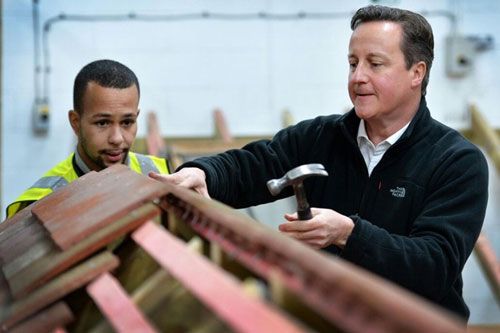
The Government has unveiled its reforms for apprenticeships, including proposals for a levy to increase investment and give industry more control over spending.
Prime Minister David Cameron outlined plans to increase the number of quality apprenticeships across England, calling on employers across the country to submit their views on the introduction of the apprenticeship levy, which is to be introduced in 2017. The levy will enable employers to choose and pay for apprenticeship training and is intended to encourage larger firms to invest in the future generation of apprenticeships.
Mr. Cameron said: “The greatest asset any employer has is their workforce. And by investing in them, they are investing in the success and future of their business.”
Nick Boles, minister of state jointly for the Department for Business, Innovation and Skills (BIS) and the Department for Education, said: “Skilled people are the lifeblood of a strong economy but for too long UK businesses have invested too little in developing their employees’ skills to meet the demands of a competitive, global market. The apprenticeship levy will ensure that businesses invest in skills and training, and will act as a much needed shot in the arm for the country’s productivity.”
The construction industry already has an apprenticeship levy in place via the Construction Industry Training Board (CITB), and it is unclear if the new levy will affect the existing system.
The consultation on the plans states: “The apprenticeship levy will be economy wide and larger employers in the construction and engineering construction industries will be in scope of the levy alongside all other larger employers in the UK economy.
“On that basis, Government and the industries need to decide how best the existing levy arrangements respond to the apprenticeship levy. One option is for employers in the construction and engineering construction industries to pay the apprenticeship levy whilst continuing to pay the existing industry levy. If this were to happen we would expect companies in the industries to fund their apprenticeships using the apprenticeship levy.
“Another option is to potentially remove the statutory industry levy arrangements completely, so that employers only pay the apprenticeship levy. This would represent a significant change to training arrangements in the construction and engineering industries and we would need to understand what effects this would have on the skills and capabilities of the UK construction industry.”
Steve Radley, director of policy for the CITB, said: “BIS has launched its consultation on the proposed new Apprenticeships Levy, which will apply to large firms across all sectors in the economy. We encourage construction employers to respond to the consultation and play their part in shaping the future of funding for apprenticeships, which are so critical for our industry.
“These proposals will undoubtedly have implications for the existing construction levy, run by CITB on behalf of industry. Ultimately, it will be for construction employers and federations to decide what type of funding and support system is needed to achieve the sector’s full potential on skills, growth and productivity.”
As part of the Government’s pledge to create three million apprenticeships by 2020, procurement rules are set to change on September 1 when all bids for Government contracts worth more than £10 million must demonstrate “a clear commitment to apprenticeships.” Employers’ bids will be reviewed in line with best practice for the number of apprentices that they expect to support. The move is aimed at widening the scope of businesses offering apprenticeships, as more than £50bn a year is currently spent on Government procurement contracts.
Sarah McMonagle, head of external affairs at the Federation of Master Builders (FMB), said: “Almost 40% of construction output comes from public sector contracts and therefore the Government has a responsibility to use its buying power to drive positive change in our industry – this is particularly the case with apprenticeship training. At present, two thirds of all construction apprentices are trained by micro firms but all businesses – large and small – need to increase the number of apprentices they are training if we have any hope of reaching the Government’s target of three million new apprenticeships by 2020.
“We hope that the measures set out in today’s [August 21] consultation drive up apprenticeship training among large employers and help ensure these bigger firms play a greater role in training our future workforce. At the same time, it is absolutely critical that support for small firms, which train the majority of construction apprentices, is not lessened as part of the Government’s next round of spending cuts.”
A series of new industry standards have also been proposed that will outline the skills apprentices in roles across a number of professions are expected to have to meet the needs of employers. The standards have been developed by a series of ‘Trailblazer’ groups of employers and businesses, which since October 2013 have collectively delivered, or are in the process of delivering, over 350 standards.
The Government’s efforts to boost the number of apprenticeships throughout the UK comes at an important time for the construction industry, which is suffering from a shortage of skills in multiple disciplines. RCI reported last week that according to the FMB, two thirds of small construction firms are being forced to turn down new business due to a lack of resources and skilled workers. Meanwhile, the Local Government Association also warned that the Government was in danger of missing its housing targets due to the shortage of skills in the construction sector.
Ms. McMonagle added: “The construction industry in particular is facing a skills time bomb with 400,000 workers expected to retire over the next five to ten years. This is very concerning given that the skills shortage is already starting to bite. The skills shortage looming large in our industry and the only way to address it in the medium to longer term is to train more apprentices.”



